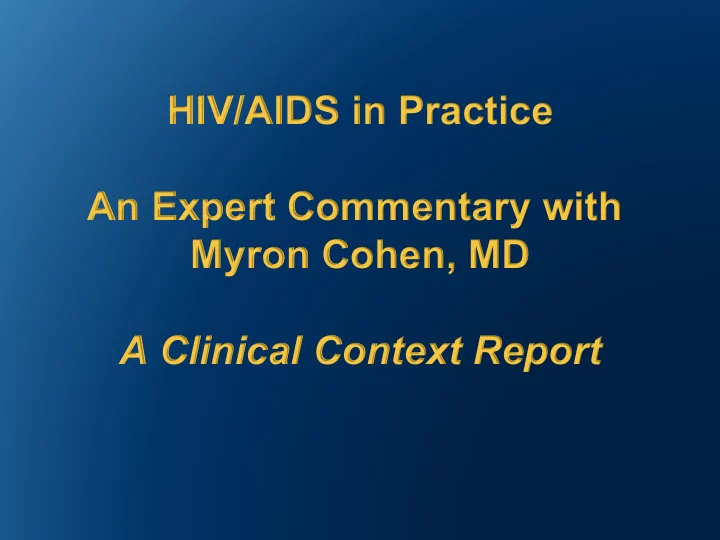

HIV/AIDS in Practice An Expert Commentary with Myron Cohen, MD A Clinical Context Report
Clinical Context: HIV/AIDS in Practice Expert Commentary Jointly Sponsored by: and
Clinical Context: HIV/AIDS in Practice Expert Commentary This activity is supported by an independent educational grant from Abbott.
HIV/AIDS in Practice Clinical Context Series The goal of this series is to provide up-to- date information and multiple perspectives on the pathogenesis, symptoms, risk factors, and complications of HIV/AIDS, as well as current and emerging treatments and best practices in the management of HIV/AIDS.
HIV/AIDS in Practice Clinical Context Series Target Audience HIV/AIDS specialists, virologists, infectious disease specialists, primary care physicians, nurses, nurse practitioners, physician assistants, pharmacists, and other healthcare professionals involved in the management of HIV/AIDS
Activity Learning Objective Upon successful completion of this educational program, participants should be able to: l Review the relevance and significance of the activity in the broader context of clinical care
CME Information: Physicians l Statement of Accreditation This activity has been planned and implemented in accordance with the Essential Areas and Policies of the Accreditation Council for Continuing Medical Education through the joint sponsorship of Projects In Knowledge and MedPage Today. Projects In Knowledge is accredited by the ACCME to provide continuing medical education for physicians .
CME Information l Credit Designation Projects In Knowledge designates this educational activity for a maximum of 0.5 AMA PRA Category 1 Credits .™ Physicians should claim only the credit commensurate with the extent of their participation in the activity.
CME Information: Physicians l Credit for Family Physicians MedPage Today "News-Based CME" has been reviewed and is acceptable for up to 2098 Elective credits by the American Academy of Family Physicians. AAFP accreditation begins January 1, 2013. Term of approval is for one year from this date. Each article is approved for 0.5 Elective credits. Credit may be claimed for one year from the date of each article.
CE Information: Nurses l Statement of Accreditation – Projects In Knowledge, Inc. (PIK) is accredited as a provider of continuing nursing education by the American Nurses Credentialing Center’s Commission on Accreditation. – Projects In Knowledge is also an approved provider by the California Board of Registered Nursing, Provider Number CEP-15227. – This activity is approved for 0.50 nursing contact hours. – There is no fee for this activity. DISCLAIMER: Accreditation refers to educational content only and does not imply ANCC, CBRN, or PIK endorsement of any commercial product or service.
Discussant Myron Cohen, MD Associate Vice Chancellor for Global Health J. Herbert Bate Distinguished Professor of Medicine, Microbiology and Immunology Public Health Director, Institute for Global Health and Infectious Diseases Chief, Division of Infectious Diseases Director, Center for Infectious Diseases University of North Carolina (UNC) – Chapel Hill Chapel Hill, North Carolina
Disclosure Information Myron Cohen, MD, has disclosed no relevant financial relationships.
Disclosure Information Robert Jasmer, Associate Clinical Professor of Medicine, University of California, San Francisco; Michael Smith; and Dorothy Caputo, MA, BSN, RN, Nurse Planner, have disclosed that they have no relevant financial relationships or conflicts of interest with commercial interests related directly or indirectly to this educational activity. The staffs of Projects In Knowledge and MedPage Today have no relevant financial relationships or conflicts of interest with commercial interests related directly or indirectly to this educational activity.
New Treatment Guidelines 2012
Immediate Start to Therapy l Treatment initiation previously guided by CD4 cell count l New guidelines urge offering treatment to all newly diagnosed patients without regard to CD4 status
Rationale for Change l All patients may benefit from antiretroviral therapy. l Key randomized controlled trial showed that antiretroviral therapy reduces risk of HIV transmission.
Considerations l Patient must be willing, able to adhere to therapy l Adherence must be supported with education l Benefit of ART not clear in patients already controlling HIV l Benefit also unclear in patients without symptoms
Considerations l Side effects of therapy l Concurrent conditions may affect timing of initiation
Recommended Initial Regimens l Efavirenz/tenofovir/emtricitabine or efavirenz plus abacavir/lamivudine in HLA-B*5701–negative patients high baseline viral load l Darunavir/r plus tenofovir/emtricitabine, atazanavir/r plus tenofovir/ emtricitabine, or atazanavir/r plus abacavir/lamivudine (in HLA-B*5701– negative patients high baseline viral load)
Recommended Initial Regimens l Raltegravir plus tenofovir/emtricitabine
Considerations l Ability of patients to tolerate certain side effects l Ability of regimen to lower viremia rapidly l Skill and experience of clinician still important in managing HIV
Summary At the end of this activity, participants should understand : • That therapy should be offered to all patients newly diagnosed with HIV regardless of CD4 count • That adherence to therapy has clinical benefits to the patient despite side effects • That adherence to therapy renders a patient almost completely noncontagious • That new options for treatment continue to evolve
Recommend
More recommend